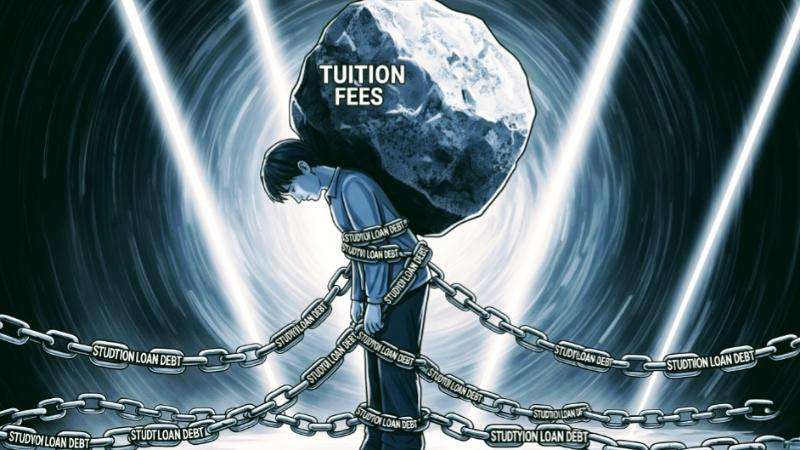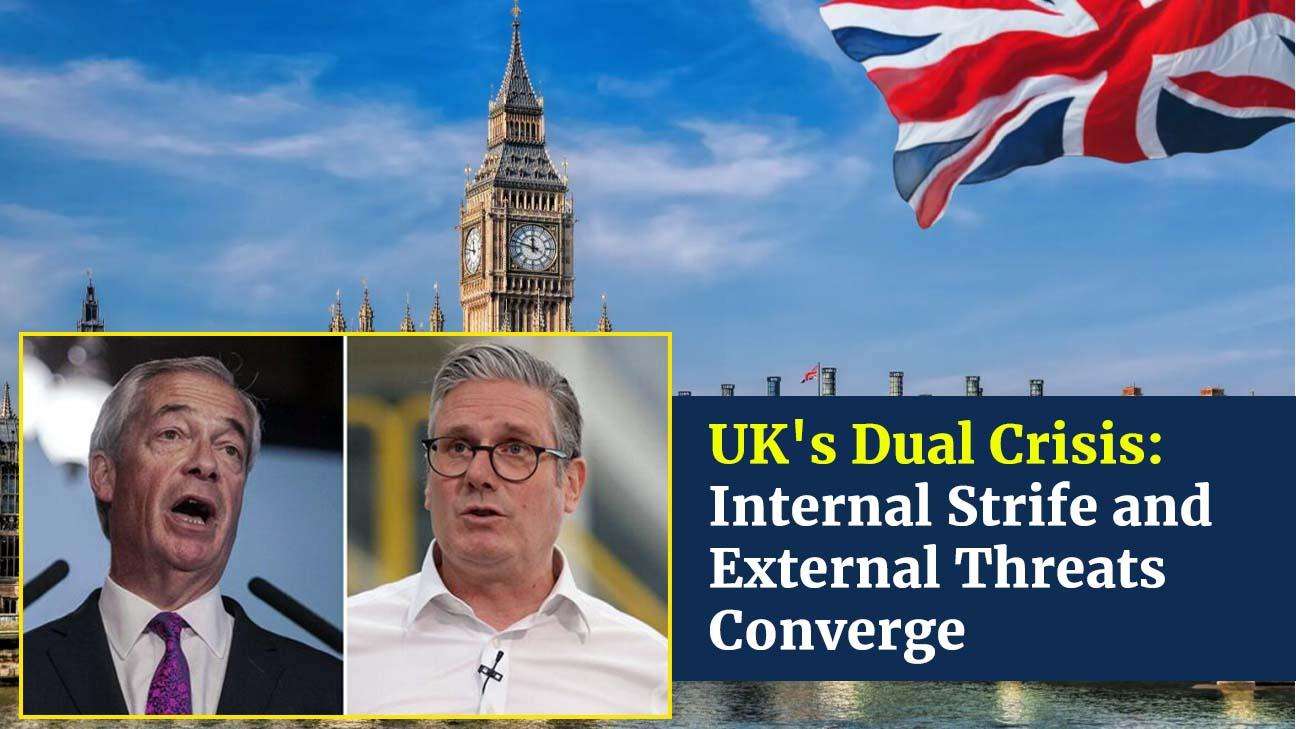The United Kingdom finds itself at a critical juncture, battling a complex "two-front war" against mounting domestic unrest and evolving global threats. The recent release of the government's National Security Strategy (NSS) and Strategic Defence Review (SDR) on June 24, 2025, issued a stark warning: the UK homeland could now face "direct threat, potentially in a wartime scenario," a reality for which the public remains largely unprepared. This external challenge converges with deep-seated internal discontent, fueled by the perceived failures of mainstream political parties and the ascendance of populist movements like Reform UK.
For too long, the political power has seemed disconnected from its citizens in many countries. This feeling of detachment, exacerbated by the global rise of extreme right-wing ideologies, has turned once minor disagreements into significant battlegrounds. Both the Labour and Conservative parties, historically the pillars of British governance, are struggling to implement meaningful reforms, leading to widespread discontent.
A significant shift in voter demographics is evident. Labour, traditionally the advocate for the working class, is increasingly drawing support from more affluent individuals, particularly those earning over £70,000 annually. This has created a void that Reform UK, led by Nigel Farage, is actively filling. Farage's assertion that Reform UK is "now the real party of the working class" is supported by data indicating a decisive shift among lower-income voters (earning £20,000 or less annually), those with less education, and strong pro-Brexit sentiments. Reform UK's populist policies, such as pledges to end the two-child benefit cap, restore winter fuel payments for pensioners, and advocate for nationalization in certain sectors, are designed to appeal directly to financially strained households.
Meanwhile, the Labour Party, under Keir Starmer and Rachel Reeves, faces internal challenges and criticism regarding its economic direction. Despite efforts to distance themselves from the Corbyn era, critics argue that policies like the "National Wealth Fund" resemble past "socialist tax-and-spend" agendas. Allegations of "stealth raids" through frozen income tax thresholds and substantial national insurance hikes, alongside proposed increases on capital gains and inheritance, draw further comparisons to Corbyn's economic blueprint, casting a shadow over Labour's ability to tackle the nation's economic woes.
Central to Reform UK's growing popularity is its strong stance on immigration. While public concern about immigration levels is a legitimate issue, Reform UK's rhetoric often leans into inflammatory anti-immigrant sentiment. Their proposals, including freezing non-essential immigration, deporting foreign nationals who have committed serious crimes, and limiting benefits for new arrivals, risk alienating and marginalizing Britain's diverse communities. Should Reform UK gain significant influence, its anti-immigration agenda could have severe consequences for British Bangladeshi, British Muslim, British South Asian, and other immigrant communities. Policies aimed at reducing immigration often lead to increased scrutiny, tightened visa regulations, and a more hostile environment. This could manifest as increased scrutiny and discrimination, where communities perceived as "immigrant" or "foreign" may face heightened scrutiny in daily life, from employment to housing. A 2020 report by the Runnymede Trust highlighted persistent racial inequalities across various sectors in the UK, noting, for example, that Black African and Bangladeshi households have ten times less wealth than White British people. Furthermore, family reunification challenges could arise from stricter visa rules and limitations on dependents, making it significantly harder for families to reunite. In 2023, the Home Office introduced stricter rules for family visas, increasing income thresholds and impacting many families. Economic vulnerability could also increase, as policies targeting benefits for new arrivals or increasing national insurance for foreign nationals could disproportionately affect those already struggling economically. According to the Office for National Statistics (ONS) data from April to June 2024, unemployment rates for some ethnic minority groups remain notably higher than the national average, with Mixed or Multiple ethnic groups at 11.5% and Pakistani groups at 11.1%, compared to 3.3% for White ethnic backgrounds. Finally, a consistent anti-immigrant narrative from a government can foster a sense of being unwelcome or "othered," eroding trust in political institutions and a sense of belonging for many British citizens from these backgrounds. The Islamophobia reporting service Tell MAMA reported that 2024 saw anti-Muslim incidents in Britain reach a record high, with 9,600 verified reports of hate incidents. To provide context for these communities, as of the 2021 Census: the British Muslim population in England and Wales was 3.87 million, representing 6.5% of the total population; the British Bangladeshi population in England and Wales was 644,881; and the British South Asian population (including Indian, Pakistani, Bangladeshi, and other South Asian ethnic groups) in England and Wales totaled approximately 5.76 million.
Adding to the political toxicity is a deeply troubling double standard in the discourse on freedom of speech and protest. Instances of Quran burning in the UK, often defended as "freedom of speech," are tolerated or even defended, despite being deeply offensive to Muslim communities. This contrasts sharply with the swift and often heavy-handed response to protests expressing solidarity with Palestine, which are frequently reclassified as criminal offenses or met with disproportionate policing. This disparity sends a clear message: the boundaries of "freedom of speech" appear to expand or contract based on the subject matter and the community involved. While the right to protest is fundamental in a democracy, the selective application of the law, where the desecration of religious texts is permitted under "free speech" but peaceful demonstrations for human rights are criminalized, sets a dangerous precedent. It not only fuels a sense of injustice within British Muslim and other minority communities but also undermines the principles of equality and fairness.
Beyond internal strife, the UK faces a burgeoning external security challenge. The recently published National Security Strategy (NSS) and Strategic Defence Review (SDR) on June 24, 2025, warns that the UK homeland could face "direct threat, potentially in a wartime scenario." This represents a significant shift from previous assessments, emphasizing a need to "actively prepare" for such possibilities. The strategy outlines plans for a "new Resilience Strategy" including public communication campaigns to inform citizens about preparedness, and annual National Exercises to test "whole-of-society preparedness." Despite these warnings, public awareness and readiness appear to lag. An Ipsos poll from May 2025 found that 48% of Britons said "there are no circumstances where they would be willing to take up arms for Britain," while only 35% indicated they would. This highlights a significant disconnect between the government's stark warnings and public readiness. The UK's defence spending in 2024 was around 2.3% of GDP, and the government has committed to increasing it to 2.5% by 2027 and aiming for 3% by 2029, with an additional £2.2 billion uplift for the Ministry of Defence budget in 2025/26. However, some analysts suggest that the actual increase for 2025-26, when excluding support for Ukraine, is a more modest 0.01% of GDP, leading to questions about the pace and commitment to genuinely bolster defences.
This external threat is further complicated by the potential re-election of Donald Trump as U.S. President. A second Trump presidency could profoundly impact UK-US relations and global stability. Trump's past rhetoric questioning NATO's value and suggesting a "two-tier" alliance based on financial contributions could force the UK and Europe to rapidly increase their defensive autonomy. His proposed 10% tariff on almost all imports would significantly impact the UK economy, which is heavily reliant on trade. In 2023, the UK exported approximately £60 billion worth of goods to the US, accounting for 15.3% of its total goods exports, and had a £71.4 billion surplus in services trade with the US. A 10% tariff could significantly reduce these figures. Furthermore, differences in foreign policy, particularly concerning ongoing conflicts in Ukraine and the Middle East, could strain the "special relationship," forcing the UK to navigate a more difficult path without a consistently reliable partner on the global stage. This potential shift away from close US alignment could ironically draw the UK closer to its European partners in a bid for greater collective security and economic stability.
The current state of British politics is one of profound instability and division, both internally and in its international outlook. The failure of traditional parties to genuinely address the pressing concerns of ordinary people has created fertile ground for populist movements like Reform UK. While their appeal to disaffected working-class voters is undeniable, their reliance on divisive anti-immigrant rhetoric, coupled with the glaring double standards in public discourse, threatens to further fracture society. Simultaneously, the stark reality of direct homeland threats, coupled with the potential unpredictability of a future US administration under Donald Trump, underscores the urgent need for robust defense and a clear, unified national strategy. Unless both major parties undergo a fundamental re-evaluation of their priorities and engage in genuine reform that prioritizes unity, social justice, and equitable solutions, the UK risks descending further into a landscape of bitterness and resentment, where the voices of reason are drowned out by the drums of division and external pressures.








.svg)


_1.jpg)
